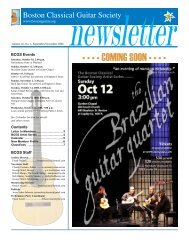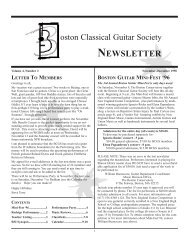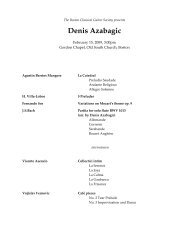2003 Jun-Aug - Boston Classical Guitar Society
2003 Jun-Aug - Boston Classical Guitar Society
2003 Jun-Aug - Boston Classical Guitar Society
You also want an ePaper? Increase the reach of your titles
YUMPU automatically turns print PDFs into web optimized ePapers that Google loves.
www.bostonguitar.org BCGS Newsletter <strong>Jun</strong>e/<strong>Aug</strong>ust <strong>2003</strong><br />
On my own initiative, I would force myself to wake up every<br />
morning at 5:00 a.m. That’s when my alarm went off, and by<br />
5:15 I was practicing. My poor father forbade me to practice<br />
Leyenda at that hour because the loud chords born upstairs via<br />
the air ducts of the heating system would jar him out of his<br />
sleep on the second floor. I used to close the ducts in the winter<br />
so I wouldn’t bother him. In this fashion I was doing three and<br />
a half hours a day of practice during school days and five hours<br />
on weekends all through high school. This was all my idea, you<br />
have to understand: I was trying to prove to Bill Viola that I<br />
was worth something. My parents, especially my father, were<br />
actually trying to get me to work a little less hard.<br />
Q: And after high school?<br />
Eliot Fisk: When I got to be college age, I went to Yale. Again,<br />
I hadn’t had any guitar teacher for a while because when we<br />
had moved from Philadelphia to Syracuse when I was 14, there<br />
had been no teacher for me in the Upstate New York area. I had<br />
no regular lessons but studied in the summer at the Aspen<br />
Music School with Oscar Ghiglia, who was a truly profound<br />
influence. I also took one 2 week class with Alirio Diaz at the<br />
Banff Center for Arts. I met Andres Segovia through Rose<br />
<strong>Aug</strong>ustine when I was 19 years old and worked privately with<br />
him for some years thereafter.<br />
My main teacher at Yale was Ralph Kirkpatrick, a very great<br />
harpsichordist and authority on Baroque music. Most of my<br />
major teachers, even on the guitar, never spoke to me about<br />
technique. Ghiglia, Diaz and Segovia almost never spoke of<br />
technique. At most they would suggest occasional fingerings.<br />
Kirkpatrick wasn’t a guitarist. So I was always forced to figure<br />
out by myself how to translate abstract musical conceptions<br />
into sound on the guitar.<br />
But I always had this great overpowering love for music. I think<br />
this is one thing that distinguishes my career and my personal<br />
life. One thing I can say is that I do have an unquenchable love<br />
for music, and I felt this, maybe even more strongly, in my<br />
early years. For me music has always had a nearly religious<br />
function. People speak of a “calling.” This is the idea behind<br />
the German word Beruf, which means “profession” but derives<br />
from the word meaning “to call.” And that is how I felt about<br />
making a life in music.<br />
Q: So it seems you always knew you wanted to make your<br />
career in music.<br />
Eliot Fisk: Well if you’re talking about making a living playing<br />
the guitar, that again also kind of evolved. I got through college<br />
and grad school at Yale in a five year program. During my<br />
senior year as an undergraduate I had just been kicked out of a<br />
bunch of high level guitar competitions. The judges didn’t like<br />
my playing. Of course, there was plenty to criticize, but I am<br />
afraid that it wasn’t that which was genuinely in need of<br />
improvement, but the very qualities that have since enabled me<br />
to make a career, that offended them: spontaneity, risk taking,<br />
originality and passion. At that time in the guitar world there<br />
was a great fear of all of these qualities amongst the people sitting<br />
on guitar juries. Some say this is still the case, that too often<br />
the person who ends up winning a big contest isn’t the person<br />
who is most interesting or who offers the most promise for the<br />
future but the one who plays it safest, and who offends the<br />
fewest judges.<br />
When I was 22 years old, I basically had almost nowhere to turn.<br />
I had no clue how to start my career. But Rose <strong>Aug</strong>ustine had<br />
not ceased to believe in me. She sponsored a big debut concert<br />
for me at Alice Tully Hall at New York’s Lincoln Center.<br />
Afterwords, due to a terrific New York Times review, I was<br />
approached by management agencies and so I began, little by<br />
little, to play in public for money.<br />
Q: Do you find being a classical guitarist to be a<br />
difficult “calling?”<br />
Eliot Fisk: There’s been a lot to battle: taxis, airlines, bad food,<br />
anonymous hotels, jetlag, people who still don’t accept the guitar<br />
as a worthy instrument make up a short list. It wasn’t and still<br />
isn’t an easy road. But there are so many wonderful friends who<br />
help so much and whose affection and support make it all worth<br />
while. But this also imposes a great responsibility. I still have the<br />
same ideals I had when I started out all those years ago, and I<br />
hope I still stand for something.<br />
Q: Do you think there’s a huge difference in entering the<br />
classical guitar world today, compared to when you started?<br />
Eliot Fisk: I was just getting to that. There’s a huge difference, a<br />
tidal wave change. I don’t think just classical guitar as we have<br />
known it, but even art music in general is under attack. My<br />
childhood was formed by the 1960’s, by the great idealism of the<br />
‘60’s. America had finally begun to address a lot of great evils:<br />
the McCarthy era, racism, militarism, the war in Vietnam,<br />
environmental degradation and later Watergate. Despite a lot of<br />
hypocritical posturing in some of the reformist circles, the country<br />
was sincerely grappling with a lot of fundamental issues.<br />
Right now a lot of these issues are again coming to the fore and<br />
we have occasion once again to remember that it was a great<br />
general, Dwight Eisenhower, who in his final address as<br />
President warned of the danger of the “military-industrial<br />
complex.”<br />
We artists, at the bottom of the societal food chain, last hired<br />
and first fired in economic downswings, are among the endangered.<br />
So we need to have a whole new set of ways of trying to<br />
convince other members of the society, particularly non-musician<br />
members of the society, that what we do is worth doing and<br />
worth supporting.<br />
(continued on page 12)<br />
5
















